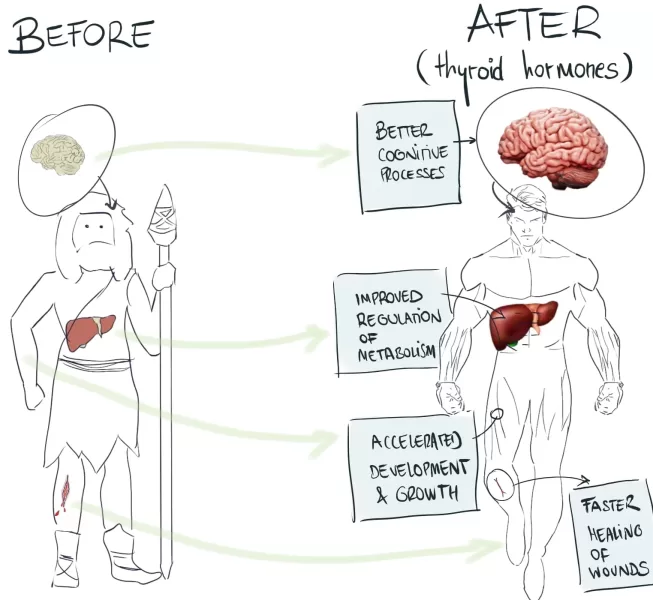Yes, I know. “Why on earth should I care about my thyroid?” — you may ask. Well, you should. Your thyroid controls your body without you even noticing.
Think about it. Are you consciously controlling your heart rate right now? Your body temperature?
Then who is?
You may think you control your body. But, to a large extent, hormones do. Especially thyroid hormones.
If you don’t believe me, think about hypothyroidism. People with hypothyroidism don’t have enough thyroid hormones. As a result, they can’t control their body and they suffer hot intolerance, obesity and a lack of energy.
To understand why we even need thyroid hormones in the first place, we need to look back a long time ago.
Let’s go back to, say, 200.000 B.C.
This was you back then, living the life in the year 200.000 B.C. You were a strong, powerful, chiseled Homo Erectus.

Those were the good ol’ times. Back then, you only depended on your skills and strength to thrive, mate and survive.
Anyway, it’s a regular Monday and you just came back from work, dragging your paycheck, a mammoth.
Family is gonna love it.
You get to your cave, leave your stake on the wall and… oh shit.
It happened again. A supervolcano went off, covering the sky with dense ashes and immersing the whole continent in a 1000-year long winter.

Great… it’s the second time you have to migrate in the last 100 years. First, the floods and now this…
Ok, but how do you plan to migrate? You really think you’ll make it?
How do you plan on surviving without food for weeks? And endure sub-zero temperatures? Can you walk hundreds of miles for the next couple years?
If you want to stand a chance, your body needs to undergo some changes, or you’ll die.
For the next years you’ll face food scarcity, natural violent events and predators. In order to survive you’ll need a new set of anatomic and physiological adaptations.
Let’s see what you’ll need:
- For food scarcity: there will be long periods with nothing to eat. Then, you’ll need to use the least amount of energy you can.
- Cold: if you face a “nuclear winter”, you better deal with extreme cold. You’ll want to modulate your metabolism and activate some thermic mechanisms (like brown fat deposits).
- Walking hundreds of miles: Your muscles will have to adapt, too. You need an increased muscle capacity to walk for long distances. We call this “hunter lifestyle”.
- Low activity years: there will be other periods when you’ll find a quiet place with food available. That’s a time to relax. We call this “gatherer lifestyle”.
- New challenges for survival: you better start making the most out of your primitive brain. You’ll need your best wit to push through challenges.
- Wounds: dying of an infected wound from a wild bear fight is not cool. Instead, you should improve your healing processes, making scars faster and more efficiently.
So how do you manage to do these things?
Good news is there were some cave men with some special substances in their blood, like natural doping. These substances do just that: they regulate metabolism and development. We will call them Thyroid Hormones.
Of course, not everybody had them.
Those who do have them will adapt and have a better chance at survival. Then, they will pass those improvements to their children and to the next generation.
On the other hand, cave men without these advantages will die and, in the long term, go extinct.
Indeed, the first cavemen had to alternate habitats often and were forced to colonize new territories.
Many scientists think that thyroid hormones allowed our ancestors to move beyond Africa and survive for over 1M years. Thyroid hormones were one of the reasons why Homo Erectus survived and others (like Australopithecus) didn’t.
Ok, but how are these hormones relevant today, hundreds of thousands years later?
Well, let me show you. This is you today.

You are a slightly overweight, sedentary homo sapiens. The top of the food chain.
Today, you don’t have to migrate to another continent, or fight violent animals. Also, you don’t have to endure nuclear winters (for now).
But that doesn’t mean we don’t face any problems as a species.
Some of our challenges today are:
- the degradation of the air and environment
- a sedentary lifestyle
- bad diets: high sugar and fats
- chronic psychological stress
Just like thousands of years ago, thyroid hormones help us deal with all these.
Our thyroid hormones travel to the right organs and improve them.
For example:
- In your heart: thyroid hormones make your heart beat faster and stronger.
- Your metabolism: they increase your metabolism, making your cells work harder and consuming more energy, fats and sugars. When thyroid levels are low, you store those nutrients instead. Also, they increase adrenaline affect, making it more powerful.
- Regulating your temperature: thyroid hormones make your temperature go up.
- Muscles: they produce more fast muscle fibers, making your muscles stronger and faster.
- Improving your development: they improve brain development, more so in newborns and babies.
Thyroid hormones kind of turn you into a superhuman:

So, whenever we are in a “stress stage”, our hormones will go up, to compensate. If there are no stressful factors, they will go down.
However, their effect is not immediate, it takes time. It’s an adaptive response that takes weeks.
We can also realize the power of these hormones by thinking of people with thyroid disorders.
Some people have low thyroid hormones levels. As a consequence, they can’t adapt to high-stress situations.
They feel tired all day, like they have no energy left. Also, they feel cold all the time, because they can’t burn calories to produce heat.
Their heart goes slower and their mind, too. They can’t think clearly.
The sooner this disorder happens, the worse consequences for the brain. In the worst case, when you get thyroid deficiency from your birth, you can develop severe mental retardation. That’s because your brain never gets a chance to develop normally and it remains child-like.
On the other hand, some people have too much thyroid hormone. They are always living like something bad is about to happen, ready for the supervolcano.
Their heart is racing all the time. They feel hot even when it’s cold, because their engines are working full throttle, producing heat. Their hands may shake and they will lose weight—after all, they are burning all their gas.
To wrap it up
Thyroid hormones have always regulated our internal processes. For thousands of years.
They are responsible for preparing us against possible dangers—either a nuclear winter or stress from your asshole boss.
They do this by “tuning” our organs: our heart rate, energy storage, muscles, brain development…
When thyroid hormones go wrong, our metabolism is screwed, too. There may be too much hormone (hyperthyroidism) or too little (hypothyroidism).
And that’s it for now folks. See you.
Leave a Reply